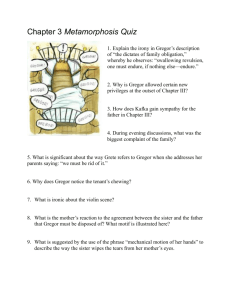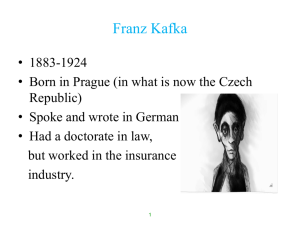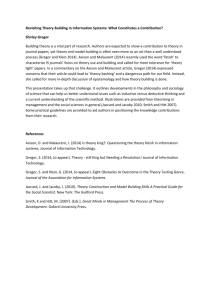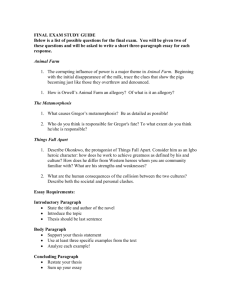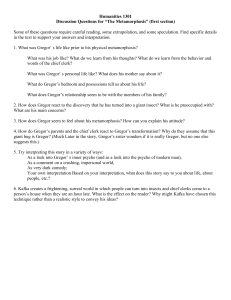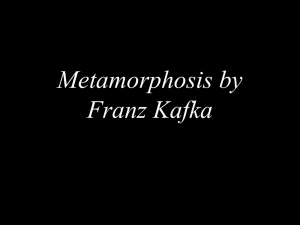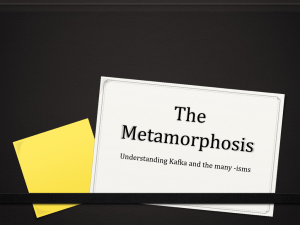KafkaPaper1 - Christopher
advertisement
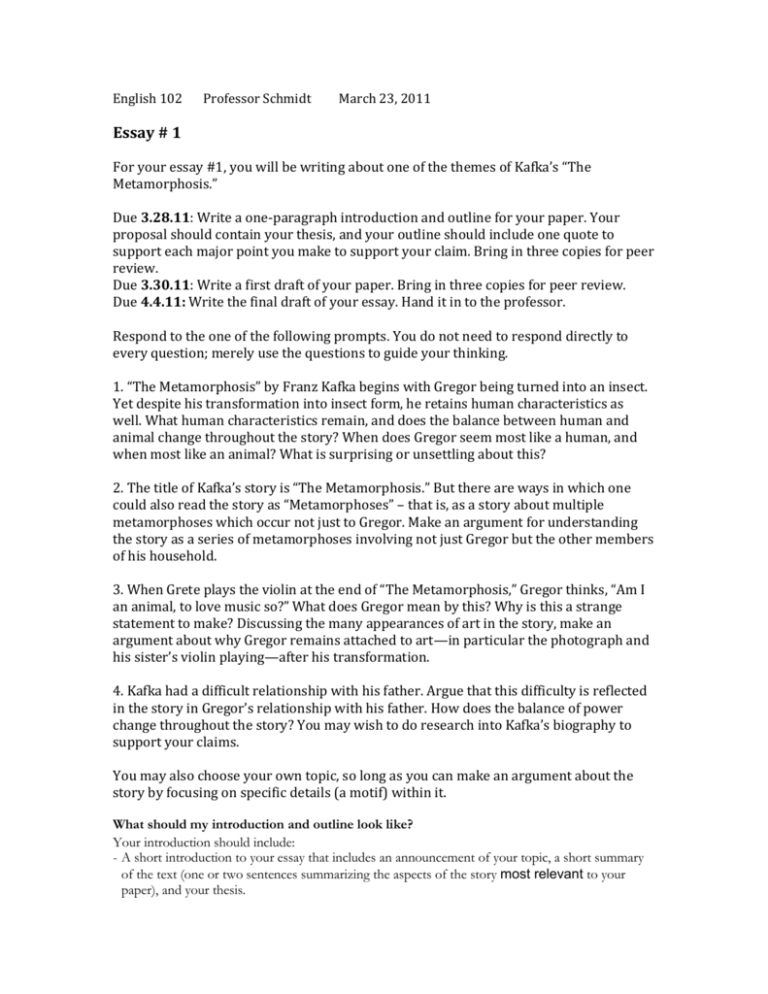
English 102 Professor Schmidt March 23, 2011 Essay # 1 For your essay #1, you will be writing about one of the themes of Kafka’s “The Metamorphosis.” Due 3.28.11: Write a one-paragraph introduction and outline for your paper. Your proposal should contain your thesis, and your outline should include one quote to support each major point you make to support your claim. Bring in three copies for peer review. Due 3.30.11: Write a first draft of your paper. Bring in three copies for peer review. Due 4.4.11: Write the final draft of your essay. Hand it in to the professor. Respond to the one of the following prompts. You do not need to respond directly to every question; merely use the questions to guide your thinking. 1. “The Metamorphosis” by Franz Kafka begins with Gregor being turned into an insect. Yet despite his transformation into insect form, he retains human characteristics as well. What human characteristics remain, and does the balance between human and animal change throughout the story? When does Gregor seem most like a human, and when most like an animal? What is surprising or unsettling about this? 2. The title of Kafka’s story is “The Metamorphosis.” But there are ways in which one could also read the story as “Metamorphoses” – that is, as a story about multiple metamorphoses which occur not just to Gregor. Make an argument for understanding the story as a series of metamorphoses involving not just Gregor but the other members of his household. 3. When Grete plays the violin at the end of “The Metamorphosis,” Gregor thinks, “Am I an animal, to love music so?” What does Gregor mean by this? Why is this a strange statement to make? Discussing the many appearances of art in the story, make an argument about why Gregor remains attached to art—in particular the photograph and his sister’s violin playing—after his transformation. 4. Kafka had a difficult relationship with his father. Argue that this difficulty is reflected in the story in Gregor’s relationship with his father. How does the balance of power change throughout the story? You may wish to do research into Kafka’s biography to support your claims. You may also choose your own topic, so long as you can make an argument about the story by focusing on specific details (a motif) within it. What should my introduction and outline look like? Your introduction should include: - A short introduction to your essay that includes an announcement of your topic, a short summary of the text (one or two sentences summarizing the aspects of the story most relevant to your paper), and your thesis. - An outline that incorporates at least four quotations that you will examine in your essay. SAMPLE INTRO and OUTLINE: Introduction In Franz Kafka’s “The Metamorphosis,” Gregor Samsa’s transformation into an insect is not only distressing to him, but causes a number of problems for his family as well. Because of the horror of Gregor’s transformation and the financial difficulties that result from his dependence on them, the family is unable to keep the same servants at home and end up hiring a charwoman. Although she appears only at the end of the story, the charwoman is a crucial figure in “The Metamorphosis,” mediating between Gregor and his family and thus effecting his separation from them and from the reader as well. Outline INTRODUCTION I. Thesis: Although she appears only at the end of the story, the charwoman is a crucial figure in “The Metamorphosis,” mediating between Gregor and his family and thus effecting his separation from them and from the reader as well. I. II. III. Unlike the other characters in the story, the Charwoman relates to Gregor not with fear or disappointment but with a kind of camaraderie. a. QUOTE: “At first she even used to call him to her, with words which apparently she took to be friendly, such as: ‘Com along, then, you old dung beetle!’ or ‘Look at the old dung beetle, then!’” (127) The Charwoman respect both Gregor’s animal nature and his human nature: a. QUOTE: “[The charwoman] credited him with every kind of intelligence” (136). Their relationship shows that Kafka intends the reader to see an identification between the charwoman and Gregor: a. Like Gregor, the charwoman is old. b. The charwoman replaces Grete as Gregor’s main contact with the outside world i. QUOTE: “From that time she never failed to open his door a little for a moment, morning and evening, to have a look at him” (127). c. Like Gregor, her presence disturbs the family order. i. QUOTE: “When the charwoman arrived early in the morning—what between her strength and her impatience she slammed all the doors so loudly, never mind how often she had been begged not to do so, that no one in the whole apartment could enjoy an quiet sleep after her arrival” (135-6). d. The charwoman has certain creaturely qualities, as indicated by her ostrich feather cap: i. QUOTE: “The small ostrich feather standing upright upright on her hat, which had annoyed Mr. Samsa ever since she was engaged, was waving gaily in all directions” (138). IV. The Charwoman disposes of Gregor’s body and thus takes the authorial presence with her from the text, bringing the story to an end.
